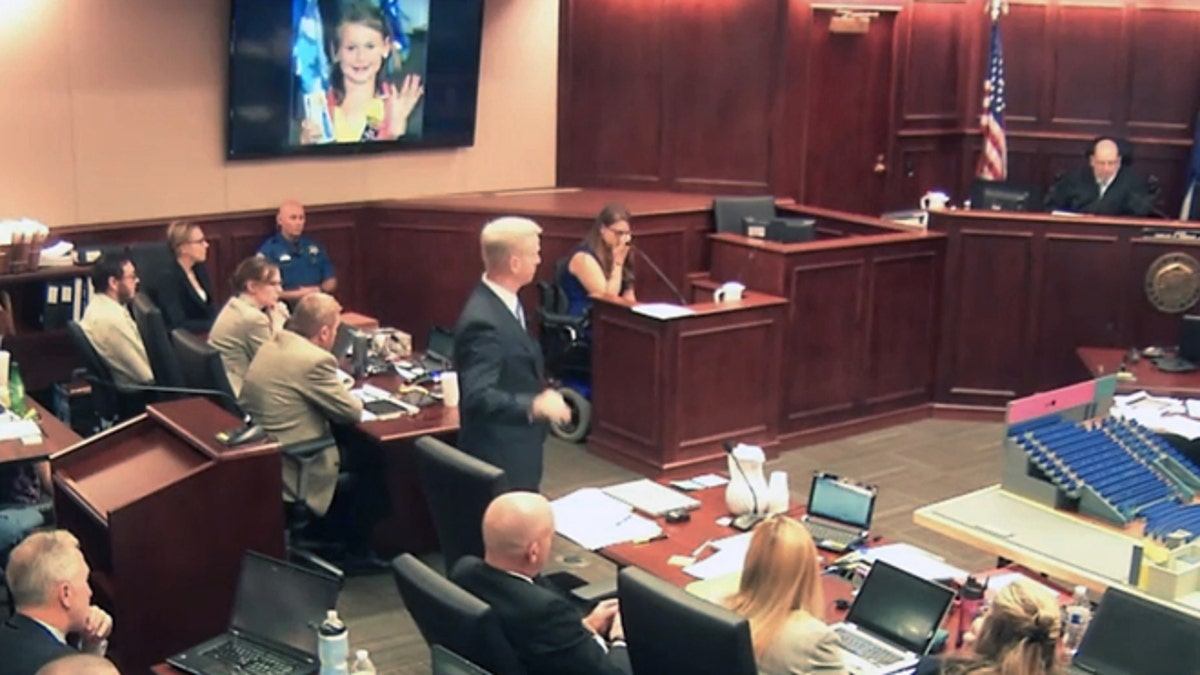
June 19, 2015: In this image taken from video, Ashley Moser, center top, who lost her 6-year-old daughter Veronica in the 2012 Colorado movie theater mass shooting, cries while testifying as a picture of her slain daughter is shown, top, during the trial of theater shooter James Holmes, pictured at top left, in Centennial, Colo. (AP)
Prosecutors rested their case Friday in the Colorado theater shooting trial rested Friday after concluding with one of the most heart-wrenching witness testimonies presented thus far.
Over the past eight weeks, prosecutors wove experts' testimony with survivors' personal stories to try to convince jurors that James Holmes was sane when he allegedly opened fire three years ago at a midnight showing of the Batman film "The Dark Knight Rises," killing 12 and wounding 70.
For its last witness, the prosecution called Ashley Moser to the stand. She was paralyzed and suffered a miscarriage in the shooting, and her 6-year-old daughter, Veronica, was killed.
Many family members, jurors and even members of the media were in tears as Moser, who came to the witness stand in a motorized wheelchair before a packed courtroom, described her daughter’s hand slipping out of her grasp.
She described hearing what she thought were kids setting off fireworks in the theater, and wanting to leave. She reached for her daughter's hand, but it slipped away.
Moser used a tissue to wipe away tears as she described the attack. She said it started with an explosion and something spewing gas behind her, then bright flashes at the front of the room. Moser said she assumed someone was setting off fireworks as a prank, and she stood up to take her daughter's hand and leave.
"Did her hand reach back?" prosecutor George Brauchler asked.
"It just slipped through my hand," she replied.
Moser said she felt a pain in her chest and fell on top of her daughter, but couldn't move.
"I heard the movie still playing and people crying and screaming," Moser said, vaguely recalling being carried out of the theater. She learned later that her daughter was dead.
As Moser testified, Holmes stared straight ahead and did not react.
The prosecution rested after displaying Veronica's kindergarten graduation picture to the packed courtroom.
Holmes' lawyers will now begin calling their own psychiatrists and presenting other evidence to argue Holmes was in the grips of a psychotic episode at the time of the shootings and should be found not guilty by reason of insanity. They plan to begin their case Thursday.
The defense says Holmes' mental illness distorted his sense of right and wrong, a key factor the jury must consider in determining if he was sane. Holmes' attorneys say he should be committed to the state mental hospital.
Prosecutors are seeking the death penalty.
Holmes abandoned a prestigious graduate program at the University of Colorado-Denver before he was charged with opening fire at the suburban Denver movie theater where more than 400 people were watching the midnight premier.
Prosecutors showed jurors nearly 21 hours of Holmes' videotaped interviews with a state-appointed psychiatrist who concluded Holmes was seriously mentally ill but legally sane at the time of the shooting.
On the video, Holmes said he felt nothing as he took aim at fleeing moviegoers. Halting and awkward, he blurted out that he feared being stopped from committing what he acknowledged was a crime.
Prosecutors also took jurors on a video tour of the theater, the camera moving past bodies wedged between rows of seats or sprawled throughout aisles amid spent ammunition, spilled popcorn and blood. The footage, taken by an investigator, zoomed in on bullet fragments, bloody stairs and shoes left behind in the panic to escape.
Prosecutors introduced a brown spiral notebook Holmes kept titled "Of Life," in which he scrawled a self-diagnosis of his "broken mind" and described an "obsession to kill" since childhood.
Holmes made lists of weapons he planned to buy and included detailed drawings of the theater complex, complete with pros and cons of attacking different auditoriums and police response times.
The Associated Press and Fox News' Kelly Burke contributed to this report.

